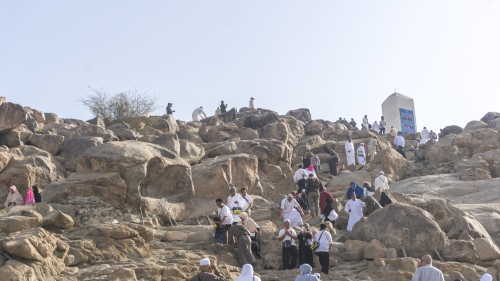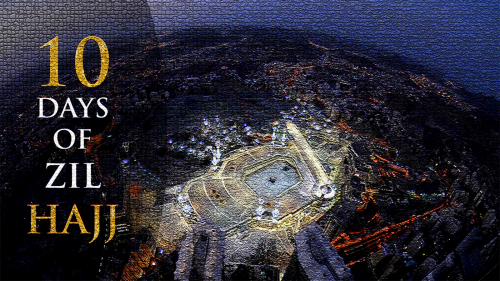Rabbis and Islam’s ‘Non-Jewish Prophet's Teaching’

Common Beliefs and Differences
There is a well-established rabbinic teaching that a universal ethical law was given in 70 different languages to all humans since the days of Prophet Noah. This universal Torah ethical law, called ‘rules for the descendants of Noah’ does not include all the unique ritual and historical practices of Judaism. As the sage of Konya, Jalal al-Din al-Rumi, says, “Ritual prayer might differ in every religion, but belief never changes.” (Fihi Mafih 49)
We should emphasize our common beliefs and respect our particular differences because, “To each among you, We have prescribed a law and a clear way. If Allah willed, He would have made you one nation, but (He didn’t in order to) test you in what He has given you; so strive (compete) as in a race to do good deeds. You all will return to Allah; then He will inform you about that in which you used to differ.” [Quran, 5:48]
Since all monotheistic scriptures come from the one and only God, the three Abrahamic religions should view each other’s scriptures as potentially enriching our understanding and appreciation of our own scripture. But in the middle ages almost all readers thought of revelation as a zero-sum sport like tennis; rather than a multiple win co-operative sport like mountain climbing.
In a zero-sum game any value or true spiritual insight I grant to another scripture somehow diminishes my own. This was the result of the influence of Greek philosophy's emphasis on the logic of the excluded middle. Something is either true or it is false. There is no other option. If two propositions contradicted one another, one or both must be false. Both cannot be true.
This would mean that if my religion is true, yours must be false. In modern terms, light could not be both a particle and a wave at the same time. Yet we now know that light is indeed both a particle and a wave at the same time; and it is the individual observer’s viewpoint that makes light a particle or a wave.
This medieval situation did not improve much in modern times. In the last two centuries university academics have written many studies of comparative religion which they claim are objective and not distorted by their religious beliefs.
Unfortunately, academics who treat other religions academically, usually do not believe that other scriptures are actually Divinely inspired. Indeed, many academics do not even believe that their own sacred scriptures are Divinely inspired. They use the same kinds of explanation to understand a revealed religion that they would use to explain secular history and literature.
As a rabbi I follow a different model, one I learned from prophet Muhammad. For example, the Mishnah (an early third century compilation of the oral Torah, states, “Adam was created as an individual to teach you that anyone who destroys a single soul, Scripture imputes it to him as if he destroyed the whole world.” (Mishnah Sanhedrin 4:5)
And the Qur'an states, “One who kills a human being, unless it be for murder or for spreading mischief in the land, would be as if he slew the whole people, and if any one saved a life, it would be as if he saved the life of the whole people” (Qur'an 5:32)
Academics explain the similarity of the two statements by assuming that since the Jewish statement is several centuries earlier than the Qur'an, Muhammad must have heard it from a Rabbi or some other educated Jew in Medina.
But I believe Muhammad is a prophet of God who confirms the Torah of prophet Moses. Prophet Muhammad has no need to learn this statement from another human being. Academics might reply that the statement is not found in the written Torah; it appears in the oral Torah written by the Rabbis in the Mishnah more than 1200 years after Moses.
But the Rabbis maintain that the Mishnah is part of the oral Torah that was passed down from Moses through many generations just as Ahadith have been passed down through the generations. Indeed, the Qur'an itself introduces this statement as follows, “It is because of this that We ordained for the Children of Israel “one who kills a human being ...” (Qur'an 5:32)
No monotheistic prophet of God needs to be informed by another human what should be written in Holy Scripture. God is the source of all Divine inspiration. There are several verses in the Qur'an that mention things also mentioned in the oral Torah.
Prophets and Holy Scriptures
My perspective is that prophets and Holy Scriptures cannot oppose one another because they all come from one source; although they can, and do present different perspectives about the same thing. Prophets are all brothers; they have the same father (God) and different mothers (motherlands. mother tongues, nations, cultures and historical eras).
For example, one of the wonderful aspects of the Qur'an is that it is the only book of revelation that explicitly includes within itself a theory of prophethood which includes other religions. Of course, there have always been (since the days of Adam) people inspired by Allah who urged their own community, in its own language, to avoid destruction by turning away from their corrupt and unjust ways and turning to the One God who created all humans.
Many Muslims believe there were as many as one hundred twenty-four thousand prophets, whose names are now unknown. Of the 25 mentioned by name in the Qur’an only four; Moses, David, Jesus, and Muhammad (Qur’an 4:163) revealed books of sacred scripture that are the bases for the three major Abrahamic religions that still flourish today. And according to the Qur'an, every nation in the world receives at least one prophet who speaks to it in its own language. (Qur’an 10:44, 14:4. 16:36)
The Bible does have this view, although the Hebrew Bible concentrates primarily on the People of Israel and their own prophets. Jews, Christians and Muslims all agree that Prophet Moses was God’s agent in saving the children of Israel from Egyptian bondage. But Prophet Amos says explicitly: "Are not you Israelites the same to me as the Ethiopians?" declares the LORD. "Did I not bring Israel up from Egypt, the Philistines from Caphtor and the Arameans from Kir? (Amos 9:7) So the Hebrew Bible recognizes religious pluralism. Prophet Jesus also says: “In my Father’s house there are many rooms.” (John 14:2)
Yet both Christians and Jews did not accept Muhammad as a Prophet because he was not Jewish. Like Islam, both Christians and Jews thought that their last Prophet, was the last prophet for everyone. But there were orthodox rabbis who thought that the Torah was both revealed to Israel in Hebrew, and to the world’s 70 non-Jewish nations in their own languages.
The Torah states: “On the day you cross the Jordan into the land the LORD your God is giving you, set up large stones and coat them with plaster. Write on them all the words of this Torah;…” (Deuteronomy 27:2-3a, and 27:8 adds two more words ‘most distinctly’ )
The Mishnah explains that the two additional words “inscribed upon it all the words of the Torah most distinctly” (Deuteronomy 27:8) means ‘in 70 languages’ [for the world’s 70 nations); thus, indicating that Torah should be translated so it could be read by everyone, and not just Jews.
The Talmud discusses this: How did the Israelites inscribe the Torah? — Rabbi Judah says: They inscribed it [the Torah] upon the stones: ‘'Thou shalt write upon the stones all the words of this Torah.' After that they plastered them over with plaster [covering them up].
Rabbi Shimeon asked, ‘Then how did the [70] nations of that period learn the Torah? — Rabbi Judah replied: The Holy One, endowed them [the 70 nations] with exceptional intelligence; and they sent their scribes who peeled off the plaster and carried away [a copy of the inscription].
But Rabbi Shimeon replied: They inscribed it [the Torah] on [top of] the plaster [to make it easy for non-Jews to read].
Both rabbis agree that Torah is for all peoples. Rabbi Judah declares that the Torah writing is under the plaster to shield [preserve] it, so non-Jewish nations need to come and get it. Rabbi Shimeon asserts the plaster under the writing serves to make Torah translation into 70 languages distinctly readable on sight to all those who pass by.
Two other rabbis are also differed about the meaning of ‘most distinctly’. Rabbi Ishmael [perhaps an Arab convert] states: “they wrote in 70 languages [the whole Torah]; while Rabbi Eleazar ben Shimeon states: “They only wrote what the nations of the world needed” [moral laws and not about Jewish ritual law]. (a Mekhilta to Deuteronomy fragment from the Cairo Genizah)
Rabbi Eleazar ben Shimeon’s statement is in accord with what the Qur'an teaches: “For every community We have appointed a whole system of worship which they are to observe. So do not let them draw you into disputes concerning this matter.” (22:67)
The above rabbinic discussion is somewhat complex because the issue of other monotheistic non-Jewish prophets or messengers bringing revelations. was moot for more than 1200 years after Prophet Moses; as Israel was the only ongoing monotheistic religious Ummah/community in the world. Only with the advent of Prophet Muhammad did the issue of non-Jewish prophets or messengers bringing revelations become important.
The rabbis understood religious pluralism to mean that monotheistic non-Jews did not need to become Jewish; so they felt no strong need to actively seek out converts to Judaism, or to promise that God would send every nation its own prophet in its own language. Rabbi Eleazar ben Shimeon’s view: “They only wrote what the nations of the world needed” [moral laws and not Jewish ritual laws] become the majority view; under the title of ‘rules for the descendants of Noah’.
Rabbi Maller's web site is: www.rabbimaller.com. He blogs on the Times of Israel web site. His new book ‘Judaism and Islam as Synergistic Monotheisms: A Reform Rabbi's Reflections on the Profound Connectedness of Islam and Judaism’ (31 articles by Rabbi Maller published on Islamic web sites) is for sale ($15) on Amazon.
Topics: Christianity And Judaism, Interfaith, Prophet Muhammad (S), Prophets, Revelation
Views: 1901
Related Suggestions

















